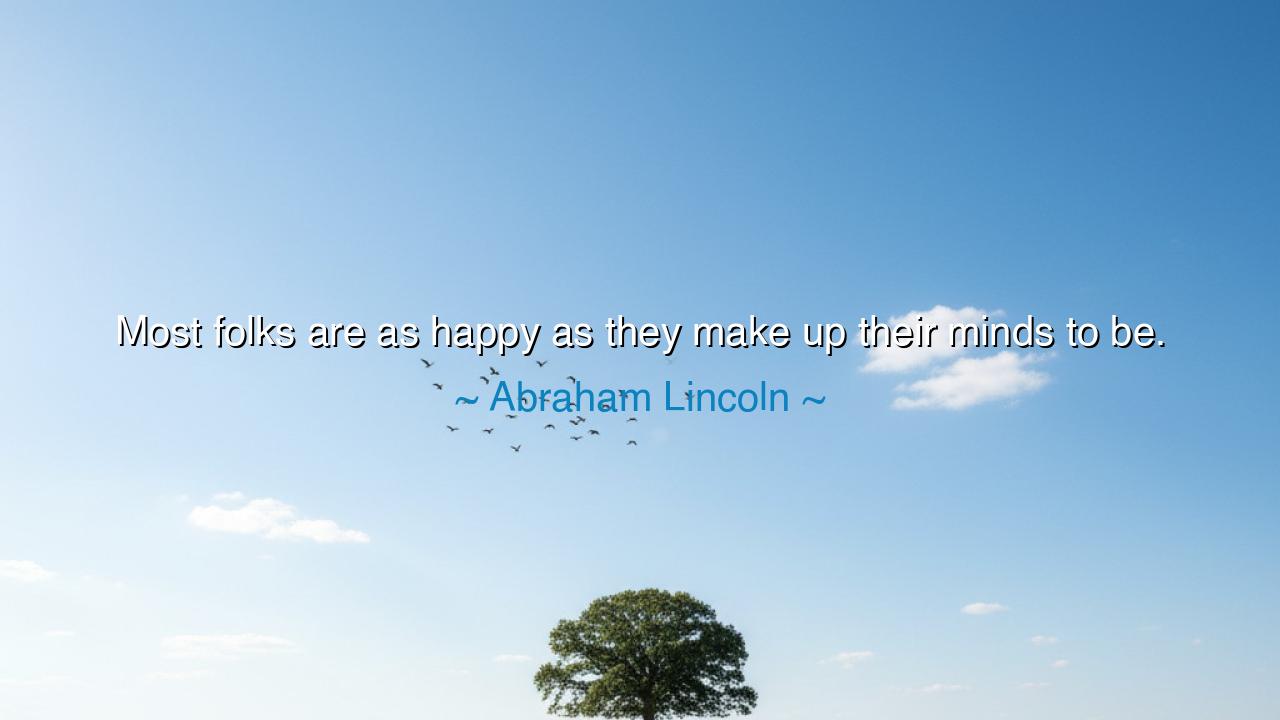
Most folks are as happy as they make up their minds to be.






In the long shadows of struggle and the bright light of human endurance, Abraham Lincoln — a man shaped by sorrow yet lifted by wisdom — once spoke these timeless words: “Most folks are as happy as they make up their minds to be.” These words, simple in sound yet vast in meaning, flow from a soul that had walked through darkness and learned that joy is not given by fate, but forged by choice. They remind us that happiness is not the fruit of circumstance but the harvest of the mind — that within each person lies the quiet power to decide the temper of their own heart.
Lincoln, the sixteenth president of the United States, was no stranger to despair. His youth was marked by poverty, loss, and loneliness. He battled the shadows of melancholy, faced the fires of war, and bore the burden of leading a divided nation. Yet from within his trials rose an unshakable calm, a steadfast faith in the human spirit. When he spoke of happiness as a matter of choice, he did so not as one untouched by hardship, but as one who had wrestled with sorrow and found his victory within. His words were not comfort for the weak but a summons to strength — to rise above the storms of life by the steady command of one’s own thoughts.
Happiness, he teaches, is not the absence of suffering, nor the abundance of ease. It is the inner harmony that comes when the mind decides to see light even in the shadow, meaning even in the trial. Two men may walk the same path — one curses the stones beneath his feet, the other marvels at the sunlight that warms his shoulders. The path is the same, yet their journeys are worlds apart. For as the ancients taught, “The world is ruled not by things themselves, but by the way we think of them.” So too did Lincoln know that the mind is a master craftsman, shaping peace or turmoil with every thought it builds.
Consider the life of Helen Keller, born into silence and darkness. She could neither see the sun nor hear the song of the world. Many would have despaired, yet she chose otherwise. Through the patient love of her teacher, Anne Sullivan, she learned not only to communicate but to live with fierce joy. “Although the world is full of suffering,” she once said, “it is also full of the overcoming of it.” In her, we see the living proof of Lincoln’s wisdom — that happiness is not found, but made; not granted, but chosen.
The mind, when guided by will and gratitude, becomes the alchemist of the soul — turning hardship into wisdom, loneliness into reflection, pain into compassion. To make up one’s mind to be happy is not to ignore sorrow, but to refuse to be ruled by it. The wise do not deny the storm; they steady their hearts within it. For joy is not the stillness of a world without wind, but the song sung bravely against it. Lincoln himself, amid war and loss, often found solace in humor, faith, and a deep belief in human goodness. Thus, his laughter was not shallow mirth but a declaration of endurance — a candle held against the darkness.
The ancients would call this mastery of the mind ataraxia — a tranquil soul unmoved by fortune’s wheel. It is a state earned through awareness: the understanding that while life may wound the body, only we can wound the spirit. To govern one’s thoughts is the greatest of all freedoms. Lincoln’s words, then, are not mere advice but liberation — a reminder that the keys to contentment are already in our hands.
Let the lesson be this: Happiness begins where choice awakens. When the dawn rises, you may greet it with complaint or gratitude — the sun shines the same, but its warmth will differ in your heart. When hardship comes, you may see ruin or opportunity; when loss strikes, you may sink into despair or rise into compassion. Each day, you may choose how you think, how you speak, how you see. In that choice lies your peace.
So, my children, remember the teaching of Abraham Lincoln — the man who smiled amid sorrow and stood steady in the storm. Do not wait for life to make you happy; make up your mind to be so. Speak gratitude instead of grievance, seek meaning instead of misery, and act with kindness even when the world is unkind. For happiness, like freedom, is not bestowed — it is claimed by those with courage enough to believe that joy, once chosen, becomes a light that no darkness can extinguish.






AAdministratorAdministrator
Welcome, honored guests. Please leave a comment, we will respond soon